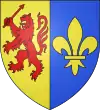Ahetze
Ahetze was a village in the traditional Basque province of Labourd and is now a commune in the Pyrénées-Atlantiques department in the Nouvelle-Aquitaine region in southwestern France. The commune is part of the urban area of Bayonne.[2]
Ahetze | |
|---|---|
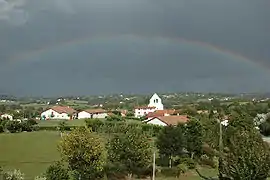 A rainbow above the village | |
.svg.png.webp) Coat of arms | |
Location of Ahetze 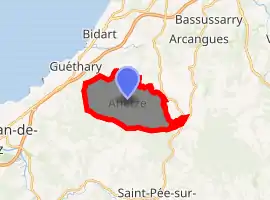
| |
 Ahetze 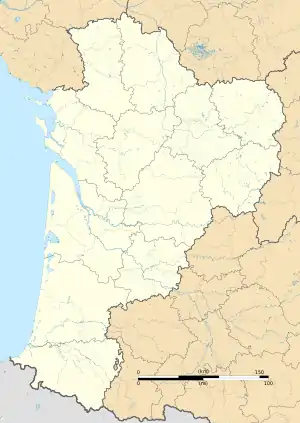 Ahetze | |
| Coordinates: 43°24′24″N 1°34′12″W | |
| Country | France |
| Region | Nouvelle-Aquitaine |
| Department | Pyrénées-Atlantiques |
| Arrondissement | Bayonne |
| Canton | Ustaritz-Vallées de Nive et Nivelle |
| Intercommunality | Pays Basque |
| Government | |
| • Mayor (2014-2020) | Philippe Élissalde |
| Area 1 | 11 km2 (4 sq mi) |
| Population (2017-01-01)[1] | 2,158 |
| • Density | 200/km2 (510/sq mi) |
| Time zone | UTC+01:00 (CET) |
| • Summer (DST) | UTC+02:00 (CEST) |
| INSEE/Postal code | 64009 /64210 |
| Elevation | 7–100 m (23–328 ft) (avg. 25 m or 82 ft) |
| 1 French Land Register data, which excludes lakes, ponds, glaciers > 1 km2 (0.386 sq mi or 247 acres) and river estuaries. | |
The inhabitants of the commune are known as Aheztars.[3]
Geography
Location
The commune is located some 13 km southwest of Bayonne and 30 km northeast of Donostia-San-Sebastion and only 4 km from the Atlantic beaches of Bidart and Guéthary.
Access
Ahetze village is at the intersection of departmental roads D655 from Arbonne to Bidart and D855 from Saint-Pée-sur-Nivelle to Saint-Jean-de-Luz. The commune can be accessed from Exit 4 (Biarritz La Négresse) and Exit 3 (Saint-Jean-de-Luz nord) from the A63 autoroute.
The Biarritz–Anglet–Bayonne Airport is 15-minute drive from the village.
Hydrography
The river Zirikolatzeko erreka, a tributary of the Uhabia, flows through the commune,[4] as well as several of its tributaries, including the Amisolako, Uroneko, and Besaingo.
Paul Raymond also stated in his Topographical dictionary of Bearn-Basque Country in 1863[5] that a tributary of the Alborga: the Haïstéchéhé flows through Ahetze after rising in Saint-Pée-sur-Nivelle.
Localities and hamlets
- Adamenea
- Aguerria
- Amizola[5]
- Arrakotenea
- Belhardiko Errota
- Biperenborda
- Borda
- Dorrea
- Etxebiaga
- Haroztegia
- Harrieta
- Ithurbidea
- Ithurbidenborda
- Laharraga
- Larramendia
- Larreluzea
- Larretxeberria
- Larrunta or Larruntaldea[5]
- Martikotenea
- Mulienea
- Olhagaina
- Ostaleriaborda
- Solorzano
- Uhartea
- Xaharrenea
- Ximikoenea
- Xirrikenea
Toponymy
The commune name in Basque is also Ahetze.
Jean-Baptiste Orpustan suggested that Ahetze comes from aiz meaning "stone" and by extension "high rock" (see also: Ahaitz).[7]
The following table details the origins of the commune name and other names in the commune.
| Name | Spelling | Date | Source | Page | Origin | Description |
|---|---|---|---|---|---|---|
| Ahetze | Ahece | 1083 | Orpustan | Village | ||
| Ahese | 1170 | Orpustan | ||||
| Aheze | 1170 | Orpustan | ||||
| de Hetsa | 1249 | Orpustan | ||||
| Villa quœ dicitur Ahece | 12th century | Raymond | Bayonne | |||
| Aheze | 13th century | Raymond | Bayonne | |||
| Ahetce | 1302 | Raymond | Chapter | |||
| Ahetze | 19th century | Lhande | ||||
| Amisolako erreka | Amisola | 1863 | Raymond | Stream | ||
| Larrustaldéa | Larungoriz | 13th century | Raymond | Bayonne | Village | |
| Ouhas-Aldéa | Ouhas-Aldéa | 1863 | Raymond | Hamlet |
Sources:
- Orpustan: Jean-Baptiste Orpustan, New Basque Toponymy[7]
- Raymond: Topographic Dictionary of the Department of Basses-Pyrenees, 1863, on the page numbers indicated in the table. (in French)[5]
- Lhande: Pierre Lhande, Basque-French Dictionary 1926
Origins:
- Bayonne: Cartulary of Bayonne or Livre d'Or (Book of Gold)[8]
- Chapter: Titles of the Chapter of Bayonne[9]
According to Eugène Goyheneche:[10] "two houses (…) had medieval names of Akarreta and Haranbillaga".
History
In the Middle Ages the Compostela pilgrims who chose the passage along the Atlantic coast passed near Ahetze, Ibarron and the hospital (Ospitale Zaharra) in Sare. Others preferred to fork through part of Ahetze to reach the chapel Saint-Jacques of Serres and also visit Vera by passing by Olhette and the Ibardin Pass.[11]
Heraldry
.svg.png.webp) Arms of Ahetze |
Blazon: Party per pale, one of Or a lion rampant of gules supporting a processional cross with six small bells all sable; two azure a pilgrim's stick of Or surmounted by two escallops the same..[12] |
Administration
_Mairie_et_fronton.JPG.webp)
List of Successive Mayors of Ahetze[13]
| From | To | Name | Party | Position |
|---|---|---|---|---|
| 1957 | 1971 | Élie Charles Philippe Marie d'Elbée | ||
| 1995 | 2008 | Pierre Cocagne | ||
| 2008 | 2011 | Jean d'Elbée[14][15] | Oceanographer & Biologist | |
| 2011 | Current | Philippe Élissalde | DVD | School Teacher, Director |
(Not all data is known)
Inter-Communality
Ahetze is a member of 8 Intercommunal organisations:
- the Communauté d'agglomération du Pays Basque
- the union of Ouhabia
- the intercommunal association of secondary schools of Saint-Jean-de-Luz
- the intercommunal association Nive-Nivelle
- the mixed association of Bizi Garbia
- the association to support Basque culture
- the joint association for drinking water from the Ura
- the joint sanitation association of the Ura
The commune is a member of the Basque Eurocity Bayonne - San Sebastian.
Population
|
| ||||||||||||||||||||||||||||||||||||||||||||||||||||||||||||||||||||||||||||||||||||||||||||||||||||||||||||||||||
| Source: EHESS[16] and INSEE[17] | |||||||||||||||||||||||||||||||||||||||||||||||||||||||||||||||||||||||||||||||||||||||||||||||||||||||||||||||||||
Economy
The flea market takes place every third Sunday of the month and regularly attracts lovers of antiques from the Paris region, to the Spanish communes all around and contributes to the economic revitalization of the village which has mainly agricultural activity.
The commune is part of the Appellation d'origine contrôlée (AOC) zone of Ossau-iraty.
Culture and heritage
Languages
The Map of the Seven Basque Provinces established by Prince Louis-Lucien Bonaparte in 1863 indicated that the Basque dialect spoken in Ahetze was Labourdin.
Festivals
Established in 1971, the Committee of Festivals of Ahetze (Ahetzeko Mozkor Banda) organises the following events: wheat threshing, dance evenings, a gala of Basque rural sports, loto, and employers' festivals that take place between 25 October and 11 November.
Civil heritage
- The Ostalapia farm, now a restaurant, is a former way station on the road to Saint Jacques de Compostela and long before was a haven for the Guethariars and Bidartars when they were attacked by pirates from the ocean or by robbers. There are some boulders once used for walls in the parking area.
- Some old Baserri dating from the 17th and 18th centuries, some of which have been extended over time. New construction follows the Labourdin style.
 Lintel dating from 1655
Lintel dating from 1655 House extension
House extension Modern Baserri (late 20th century)
Modern Baserri (late 20th century) Basque House under a storm
Basque House under a storm
Religious heritage
The Church of Saint Martin (16th century)![]() is registered as an historical monument.[19] The church contains a number of items that are registered as historical objects:
is registered as an historical monument.[19] The church contains a number of items that are registered as historical objects:
- A Retable and 7 Paintings (1700)
 [20]
[20] - A Processional Cross (15th century).
 [21] This cross, whose arms are garnished with bells, was used in witchcraft trials in the year 1609 to the outrage of Councilor Lancre[22] who saw it as an evil object. The carvings on the Cross represent the faces of Christ, the Virgin, Saint John, a pelican, and two women's heads. On the back of the cross there is the representation of a bishop, undoubtedly Saint Martin.[10]
[21] This cross, whose arms are garnished with bells, was used in witchcraft trials in the year 1609 to the outrage of Councilor Lancre[22] who saw it as an evil object. The carvings on the Cross represent the faces of Christ, the Virgin, Saint John, a pelican, and two women's heads. On the back of the cross there is the representation of a bishop, undoubtedly Saint Martin.[10] - A Statue: Virgin of the Assumption (18th century)
 [23]
[23] - A Statue: Saint Jacques dressed as a pilgrim (18th century)
 [24]
[24]
- A Retable and 7 Paintings (1700)
Eugène Goyheneche[10] noted that the church quite exceptionally possessed a register of Catholics in Basque.
- The Church Picture Gallery
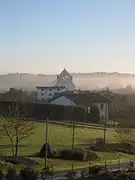
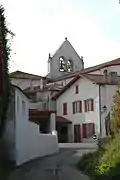 The bell tower seen from the village
The bell tower seen from the village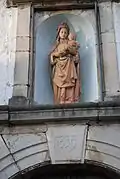 Entrance to the Church
Entrance to the Church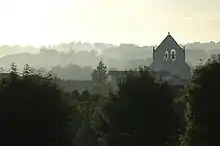 The Church
The Church Close up of the Bells in the church
Close up of the Bells in the church_Choeur_de_l'%C3%A9glise.JPG.webp) The choir of the church
The choir of the church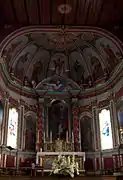 Interior of the church
Interior of the church_Autel.JPG.webp) Altar with two pelerins of St. James
Altar with two pelerins of St. James_D%C3%A9tail_du_retable%252C_l'Annonciation.JPG.webp) Altar piece detail: The Annunciation
Altar piece detail: The Annunciation_d%C3%A9tail_du_retable%252C_Anne_salue_Marie.JPG.webp) Altar piece detail: Anna greeting Maria
Altar piece detail: Anna greeting Maria_Vitrail_Notre_Dame_du_Rosaire%252C_Mater_purissima.JPG.webp) Stained glass in the church
Stained glass in the church_Vitrail_notre_Dame_du_Rosaire%252C_Rosa_mystica.JPG.webp) Stained Glass, Lady of the Rosary
Stained Glass, Lady of the Rosary
Environmental heritage
On the heights of Ahetze all the Basque mountains near the Atlantic are visible: the Rhune, the Mondarrain, the Artzamendi, and the Ursuia in France as well as the Three Crowns in Spain.
Facilities
Sports and sports facilities
Ahetze has two Frontons, one is old and built into the wall of the town hall, a second was completed in 2008 as part of the new development of the town.
A Trinquet called Pantxoa Sein is next to the primary school.
A marked fitness trail runs through the south-east of the village.
Education
Ahetze has a primary school and a nursery.
Health
Ahetze has several health services: a general practitioner, a dentist, a nurse, a physiotherapist, and a speech therapist.
Notable People linked to the commune
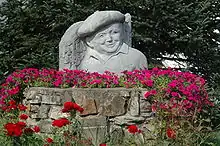
- Mattin Treku,[25] born on 11 November 1916 in Ahetze and died on 22 July 1981 in the same commune, was a Bertsolari (singer of bertso) renowned in French Basque Country.
- Morton H. Levine,[26][27] born in California and died in 1982, was a North American Anthropologist who, during the 1960s, conducted the first research that highlighted specific Basque haematology with the entire population of the villages of Macaye and Ahetze.[28] These studies put in evidence in relation to the surrounding population the high frequency of blood group O and Rh negative and the particularities of distribution of Gm antigens and HL-A.
See also
Notes
- Piarres Erdozaintzi is a sculptor born in 1957, resident in Saint-Just-Ibarre - Source: Harria et herria, Pierre et pays, Bulletin du Musée basque, 2003 (in French)
References
- "Populations légales 2017". INSEE. Retrieved 6 January 2020.
- Commune d'Ahetze (64009), INSEE
- Inhabitants of Pyrénées-Atlantiques (in French)
- Sandre. "Fiche cours d'eau - alhorgako erreka (S5010500)".
- Raymond, Paul (1863). Topographic Dictionary of the Department of Basses-Pyrenees (in French). Imprimerie nationale. (Digitised from Lyon Public Library 15 June 2011)
- Géoportail, IGN (in French)
- Orpustan, Jean-Baptiste (2006). New Basque Toponymy (in French). Presses universitaires de Bordeaux. ISBN 2-86781-396-4.
- Manuscript from the 14th century in the Departmental Archives of Pyrénées-Atlantiques (in French)
- Chapter of Bayonne in the Departmental Archives of Pyrénées-Atlantiques (in French)
- Eugène Goyheneche, Basque Country: Soule, Labourd, Lower Navarre, Société nouvelle d’éditions régionales et de diffusion, Pau, 1979, BnF FRBNF34647711 (in French)
- Philippe Veyrin, The Basques, Arthaud, 1975, ISBN 2 7003 0038 6, page 53. (in French)
- Guy Ascarat Archived November 9, 2013, at the Wayback Machine
- List of Mayors of France (in French)
- At a council meeting on 21 September 2011, Mayor Jean d'Elbée, in response to a blockage of the decision-making process, called for the resignation of the entire council. After two rounds of municipal elections on 20 and 27 November 2011 Philippe Elissalde was elected mayor
- "Count rendered by the Municipal Council on 21 September 2011" (PDF) (in French).
- Données Cassini, EHESS
- Population en historique depuis 1968, INSEE
- Another Hilarri from Ahetze is displayed in the Bayonne Basque History Museum.
- Ministry of Culture, Mérimée PA00084305 Church of Saint Martin (in French)

- Ministry of Culture, Palissy PM64000023 Retable and 7 Paintings (in French)
- Ministry of Culture, Palissy PM64000022 Processional Cross (in French)
- Philippe Veyrin, The Basques, Arthaud, 1975, ISBN 2 7003 0038 6, page 303. (in French)
- Ministry of Culture, Palissy PM64000731 Statue: Virgin of the Assumption (in French)
- Ministry of Culture, Palissy PM64000730 Statue: Saint Jacques dressed as a pilgrim (in French)
- "Xalbador eta Mattin". YouTube.
- http://www.euskomedia.org/aunamendi/80869
- Claude Dendaletche, The Basque Archipelago, Éditions Privat - Cahors, 2005, ISBN 2 7089 5619 1, page 133 (in French)
- The results of these studies were published in 1967 (The Basques Natural History, New York, J. Dausset, L. Legrand, M. H. Levine M. H., J. C. Quilice, M. Colombani, J. Ruffié), 1972 (Genetic Structure and Distribution of HL-A Antigens in a Basque village, in "Histocompatibility Testing", Copenhague, J. Ruffie, M. H. Levine, M. Blanc, P. Richard), 1972 (A New lmmunoglobulin haplotype Gm (-1, -17, 21) in a Kurdish isolate and in a French Basque village, M. H. Levine, J. Ruffie, H. Darrasse) and in 1973 (Basque Isolation: I A Hemaypological Survey of Basque Villages)
External links
| Wikimedia Commons has media related to Ahetze. |
- Official website (in French)
- Ahetze in the Bernardo Estornés Lasa - Auñamendi Encyclopedia (Euskomedia Fundazioa) (in Spanish)
- 25 photos of Ahetze (in French)
- Ahetze on Lion1906
- Ahetze on the 1750 Cassini Map







